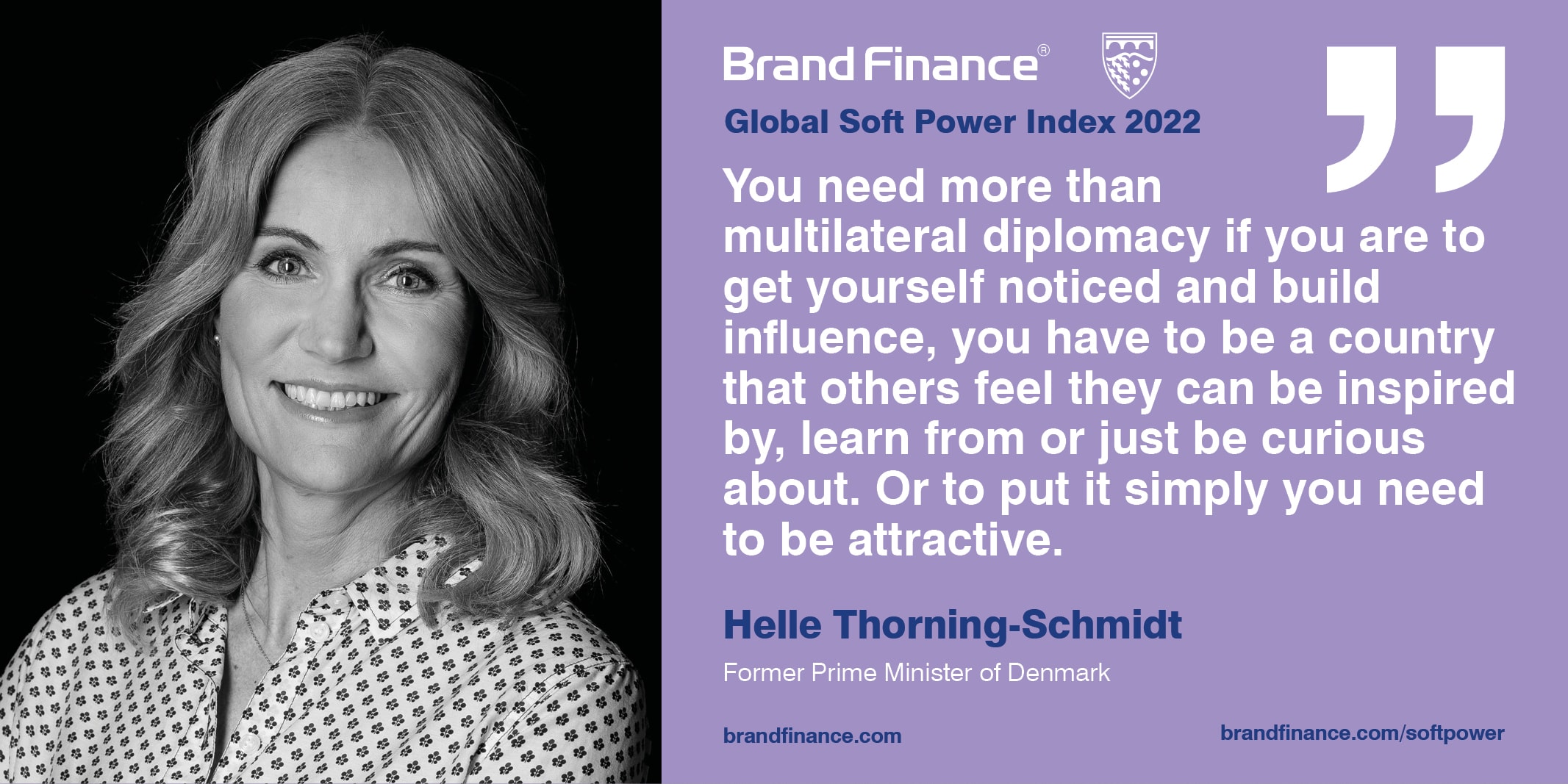This article was originally published in the Global Soft Power Index 2022.

The evening before I visited President Obama in the white House, my team and I shared a night cap in Blair House in Washington DC. Whilst super focused on the agenda we also had a few laughs, and bets were made on whether the President would tell me that Denmark was punching above its weight on the global stage. He did, and in fact it was almost the first thing he said.
The story tells you that you that silly banter with colleagues doesn’t stop when you become PM, but more importantly it tells you how much we Danes want our mighty ally to notice what we are doing. Deep in our Danish bones we know that the first, the second and the third rule of Danish foreign policy is to be seen as bigger than our size. The hard power tools to achieve this are obvious: be an active member of NATO, take part in the most important missions from Afghanistan to Libya to combatting piracy around the Horn of Africa. Be nimble and rapid in deploying your military and share intelligence with your allies.
But the reality is that hard power will never be the thing that gets Denmark noticed, as we simply do not have the scale to make a decisive impact.
We can and we do make a significant contribution through our membership of international organisations. As a member state of the European Union, the Arctic Council and NATO we are able to strengthen and amplify our ability to influence global affairs.
But you need more than multilateral diplomacy if you are to get yourself noticed and build influence, you have to be a country that others feel they can be inspired by, learn from or just be curious about. Or to put it simply you need to be attractive.
So here are four ways to generate the power of attraction, otherwise known as soft power:

First, do good things and be the first to do them. Denmark is widely recognised as one of the first movers in terms of recognising and seeking to reverse climate change. For decades successive Danish governments have talked about renewable energy, and substantial sums of money have been invested in the technology to drive the transition to net zero. As a consequence, Denmark is now home to some of the biggest green energy companies, and there can be no doubt that this position has given a platform and a voice in climate diplomacy that we would not otherwise have had.
Second, be more accountable and generous than the rest. There is a small club that only a handful of countries belong to: those of us who donate more than 0.7% of our GDP to developing countries. This gives us permission to speak and to be heard on development policy and the like in the UN, beyond what a small country would normally expect to have.
Third, secure high growth and combine it with high levels of equality. There can be no doubt that the so-called ‘Nordic Model’ has delivered for the Nordic societies. We are amongst the wealthiest nations of the world, whilst also being amongst the most equal. And there is very broad democratic support for the model: just about any Nordic person you meet will grumble that taxes are a bit high, but will qualify that complaint by expressing pride in the welfare state, free healthcare, free education, decent salaries, high productivity, no corruption, lots of opportunity and equality. And all of this plays out in the endless competition between Denmark and Finland to top the annual Global Happiness Index!
Fourth, never forget the power of culture. Many of you will have watched a couple of Nordic Noir series, whilst struggling with the subtitles, no doubt! One in particular has played an important role in building Denmark’s soft power. A year before I became Prime Minister the first episode of Borgen was aired. Here you had it, for the first time and on primetime TV: a Danish female prime minster. I have no doubt that the fictitious character of Birgitte Nyborg, made it easier for the Danes to imagine a real life female PM. What I didn’t realise was that the show would give people who never thought they needed to know this an insight into the Danish political system. Our numerous political parties and cumbersome coalitions. For Denmark it has been significant. For me personally even bigger. Countless conversations with PMs and presidents from Japan to Ethiopia to France have been opened by comments and enquiries about Borgen. Sometimes it has been like the Danish PM was known even before she touched down in the airport - you really can’t ask for more soft power than that.
If I had to define soft power in a few words, I’d say it’s when someone does a double take and listens to what you have to say, even when the traditional rules of diplomacy mean they don’t really have to.
No small nation can ever afford to forget that soft power is what actually makes the difference, if we truly want to punch above our weight.

